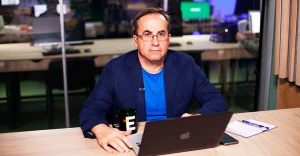
Azov fighter Kyrylo Berkal (call sign Kirt): War with Russia will never end unless Ukraine wins it
Commander of the military school of the Azov regiment, former commander of the second infantry battalion Kyrylo Berkal speaks on 9 years of fighting in the war, Ilovaisk, Mariupol, Russian captivity and returning to the army
About the hero
Kyrylo Berkal was born on May 8, 1988 in Kyiv.
He is a major in the National Guard of Ukraine, holder of the Order of Merit, III class. Kyrylo Berkal has received other state awards, including the medal For Military Service to Ukraine and Weapons of Honour. He joined the Azov Regiment in 2014. He fought near Ilovaisk, he was in charge of the unit during the Shyrokyne operation. The fighter is the head of the Colonel Yevhen Konovalets Military School of the Azov Regiment. In February and May, he defended Mariupol.
He was captured by Russian forces. In September 2022, together with his comrades, Russia exchanged Berkal for Viktor Medvedchuk, former Ukrainian politician close to Russian President Vladimir Putin.
The Azov Regiment's military school and training
I know that a military school named after Colonel Yevhen Konovalets was established in Azov with your participation. And the school is operating. And I know that it is almost the only school in the Ukrainian army, in the Armed Forces of Ukraine in particular, that operates according to NATO standards. What kind of school is it? Could you please tell us with whose help it was created and what is its current state?
You know, the school was founded on a voluntary basis. First of all, our first honorary commander, at that time a member of the Ukrainian parliament, Andriy Biletskyi, agreed and found volunteers, former military men who had once served in the armies of Georgia, the US, and Canada, and ethnic Ukrainians, to conduct a command and staff training for us, a training for officers. We, the officers who had gone through this hot phase of 2014-2015 fighting, were sent to such training. We had a thirst for fighting, but no professional skills. So we were given training, a command and staff course. If we take it in its original form, it consisted of 4 large programs and was supposed to last about 1.5 years. We completed it in about 3.5 months with great intensity. We studied the military decision-making process, and during the planning phase, we planned for 18 hours a day. We were put into this system of no sleep, constant work, and constant stress. This is exactly what we have faced in Mariupol later, what we face during our combat operations. Then we faced a big problem - the creation of the newest sergeant corps, we were explained how the officer and sergeant ranks should work. Therefore, the next challenge was to create the Sergeant Corps. We selected the best of the best of our soldiers, sergeants, and sent them to this course. About half of the cadets graduated. And they became the golden graduates of the Konovalets military school, who became our first professional instructors.
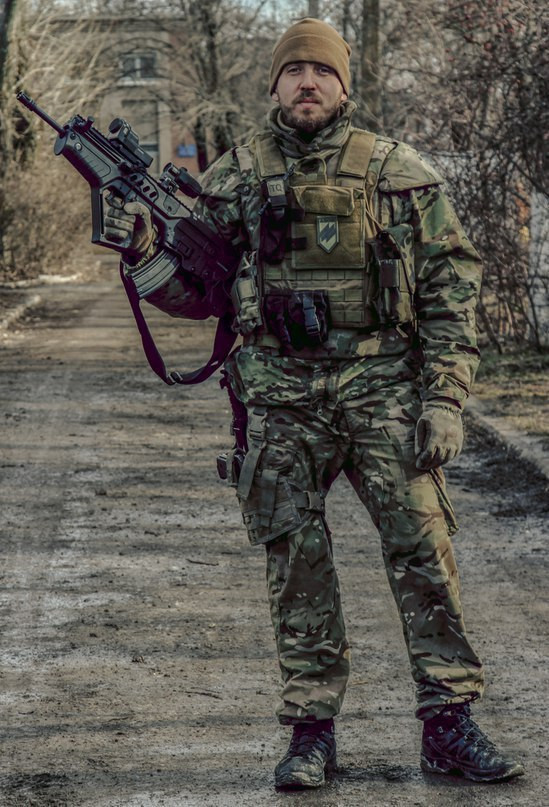
When I joined the school following my teacher and friend, Lieutenant Colonel Giorgi Kuparashvili, we faced the next big challenge: creating new technical literature, translating Western field manuals. This is our personal achievement. We translated the manuals of our Western colleagues, combined them with our Anti-Terrorist Operation experience, and most importantly, implemented it in life, in our realities, in our legal norms. There were a lot of obstacles, a lot of nuances, but we succeeded. The main task was to launch the analysis, to launch the consciousness of the Ukrainian soldier. Because it is a thinking warrior, a thinking, intellectually developed person who can survive on the battlefield and make the right decision at the right time. The Western idea of the military is the idea of preserving human life, that the most important and precious thing we have is a person, they invest huge amounts of money and equipment, but it is a person that is key. Because equipment can be provided, equipment can be repaired. But if we lose a professional, it is a painful loss, irreplaceable. That is why the principle of preserving human life became close to our hearts, because our entire combat path is based on fraternity, on the brotherhood of combat. We could not afford to lose our guys, we could not afford to make the same mistakes tomorrow that we made today. That is why this process of professionalism became the credo of the military school.
That's how we melted iron into steel, created the Azov Ridge and the Azov Sergeant. More than a thousand Azov soldiers who fought in Mariupol underwent basic combat training, and almost all of our sergeants were trained in our sergeant school. Most of our officers have also been trained at our military school. It was this path to professionalism, the path to continuous development, that created this phenomenon. Despite the fact that Russian propaganda was constantly putting huge obstacles in our way, we did not receive support from our Western partners, and foreign missions did not train us. At first, we were trained by a group of volunteers, enthusiasts, and then we developed everything ourselves. Only then did we overcome the iron wall and start working with Unifier missions to create training programs for the entire National Guard of Ukraine. This process probably distinguishes us from other units. We are not looking for excuses, we are looking for opportunities.
In other words, you were actually training people on wheels, constantly on the move and in a combat situation. And this actually distinguishes your regiment from all the others, because you had your own school, your own standards. And it was against these standards that Russian propaganda worked quite actively, because they understood that, in principle, an army that fights according to NATO standards is a new kind of army, not a post-Soviet army, which was the Ukrainian army for a long time.
Yes, you are right. This is exactly our principle, our understanding. Because most of the Azov people who joined us from the very beginning came for the sake of one idea. We didn't come to serve and get awards or just get a good job, we came to win back what was ours. In the beginning, most of the battalion consisted of people from the occupied territories. These were Crimeans, guys from Luhansk and Donetsk. That's why our idea was based on just one thing: to get back what was ours, to gain an independent, united Ukraine.
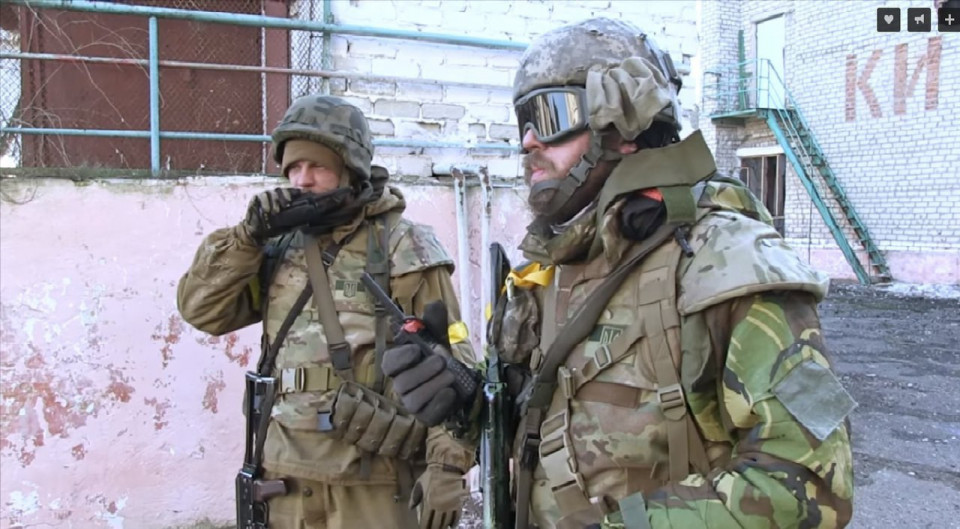
Mr. Berkal, in 2015, you took part in the Pavlopil-Shyrokyne operation. You were the field commander who led the recapture and retention of Shyrokyne. Please tell us about the course of this operation. This Shyrokyne operation was, firstly, successful, and secondly, it made it clear to Russia that they would not approach Mariupol easily, although they obviously had such a possibility and such plans as of January 2015.
To put it simply, all military operations can be divided into 3 types. They must have 3 objectives. There is a strategic task, and the strategic task of the Pavlopil-Shyrokyne operation was to pull back the reserves from the besieged Debaltseve. To allow our units, our guys who are already in the encirclement, to rest a little and seize the initiative. The operational task was to pull the front line away from Mariupol and create a defense shield around the city. Because at the time of the Pavlopil-Shyrokyne operation, there had been no offensive actions in this direction. The front line, the gray zone, began immediately on the outskirts of the Skhidnyi neighborhood. The tactical objective was to recapture Pavlopil. At first, Shyrokyne was a secondary task, it was supposed to be a distraction, the main offensive was planned for Pavlopil, but as always happens, what was originally the main task becomes a secondary one, and vice versa. And so what was an operational task, to delay, to create a shield for Mariupol, became a strategic task in 2022. The fact that we were able to recapture more than 20 kilometers of our territory and create 3 more defense lines is what allowed us to hold Mariupol for so long. If we had been on the same borders as before this operation, the enemy would have simply entered Mariupol from 3 sides. And so we had a chance, we had 3 lines of defense to hold.
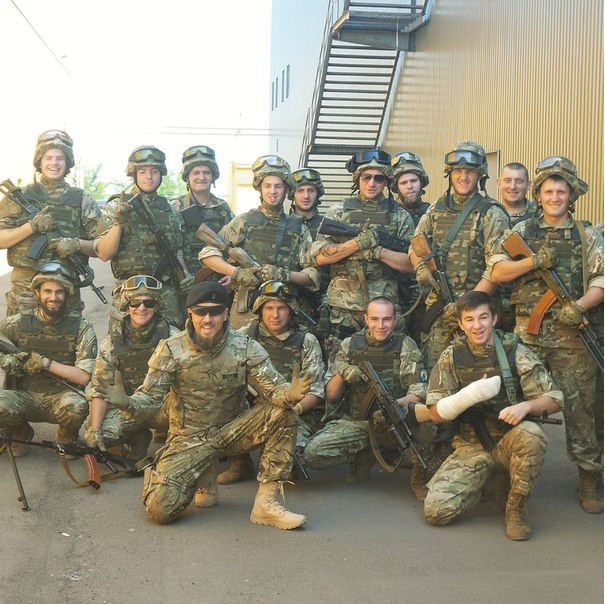
And what can you say, Mr. Berkal, about Russian forces, the enemies of Ukraine, the occupiers, whom you often met face to face? In the Ukrainian media, it is often said that they are just zero, chmobiks, mobiks, that they are nobodies and have no name. What can you say about the Russian army and the Russian soldiers you have been fighting with since 2014?
You know, face-to-face is not the same kind of war. We are in the ranks without shields and axes, we have not met that often. Most of those who were later captured, we can say that they were cynical hypocrites who tried to pin their crimes of destroying Mariupol on us. They wanted to force us, the prisoners, to sign and take responsibility for it personally. We really didn't do that, we didn't even have our own artillery in March. They destroyed the city and cynically tried to make us scapegoats. You know, you can't disrespect or underestimate your enemy, because it usually leads to defeat. But they are all blinded by propaganda. I saw this personally. They are coming, they are coming, they are coming, they have been given this picture that no one in their sane mind could have believed. Back in 2014, we wondered how they could believe in this, in 2020, in 2021. And they keep coming and coming, and they firmly believe that they are fighting a mythical fascism. They are told you can kill, you can destroy cities, but it's not your fault, it's their fault. And they begin to believe in this, to find justification for their conscience. But they have no conscience. They are doing, as I tell you, lowliness and hypocrisy. They do it all cynically. That's why, you know, there is officer respect for each other, but I didn't see it from them. If we usually treated prisoners and the enemy with respect, provided assistance, the enemy did not show such respect to us. Therefore, we should not underestimate the enemy, Russia is able to adapt, Russia can also draw conclusions, so the most important thing is not to relax and continue our work. The truth is, in all cases, on our side, we are on our own land. We are not fascists, we have not tortured or killed anyone. We are defending our historical borders, our land, where we have been living for more than a thousand years. Our country has a thousand-year history, which Russia wants to take away and make its own, unfortunately. In no way can we allow these concepts to be substituted. This is our land, so we will win.
Defense of Mariupol and Azovstal, Russian captivity
How did Mariupol meet Russian invading forces? What happened in Mariupol in the early days?
Mariupol met the enemy with the fire of Ukrainian weapons. How did people respond? They went to mobilize, many came to the military, to the National Guard units. We tried to teach them something in a day. Of course, this is heroic madness and suicide, because no one expected the fullness of the war, and we have never known such a war. Nevertheless, Mariupol began to unite - people donated their cars and helped. Everyone tried to work as a single organism. Yes, it was disorganized, but the defense headquarters was created to bring order to this chaos. We made every effort to unite all the units, to harmonize them and give a worthy response. This task was almost impossible. According to all the assessment matrices, we should have held out for 3 weeks, a month at most. We didn't have enough heavy weapons and ammunition. There was no reliable air defense support. But almost every person at their positions was doing 1000%, stopping the enemy. The first days were hell. You know, nowadays people hardly react to the air raid alarm, but for me the siren will always remind me of Mariupol. In the early days, I heard these sirens and immediately afterwards a Grad missile would fall and cover residential buildings, killing our citizens. These were terrible events, and I have a very sensitive attitude to air raid alarms.
The people of Mariupol, most of them, tried to unite around us and make some contribution. Everyone was working to the best of their ability. I personally worked with the National Police and remember those guys and girls who came on the first call and tried to help wounded civilians. I remember their eyes and trembling. I tried to cheer them up and informed them about our military successes, which at that time were in other regions. For the first 3 days, we suffered air and artillery strikes, and there was no enemy yet. We were afraid that Kyiv would fall and that, God forbid, a peace treaty would be signed and we would be simply surrendered. But there was no time to worry about that. We had to do our job.
For almost 3 months you held the line and defended the city. Then you were surrounded at the Azovstal plant and the whole world was talking about you. The military leadership ordered you to leave the plant and you complied. How did those who were at Azovstal react to this decision?
If I recall everything quickly, it was very difficult for us at Azovstal in a certain sense, because there were many wounded and we had nothing to treat them with. On the other hand, the frontline had already shrunk and there were more or less enough of us to keep combat duties, while the enemy no longer had that maneuver. All this time, everyone was fighting without sleep for every house and piece of land, destroying enemy equipment and occupiers. We all realized that we were probably not going to return home, but we had to hold our ground as long as possible to give Ukraine time to defend its independence. We had to keep Kyiv, Zaporizhzhia, and Bakhmut from falling. When the order came, the leadership first tried to make a green corridor for the wounded, but the occupiers gave an ultimatum - all or nothing. With great pain and the understanding that we might be executed, we fulfilled the order. We realized that there were our brothers who were already rotting alive and needed help, which made us look at the other side of the medal.
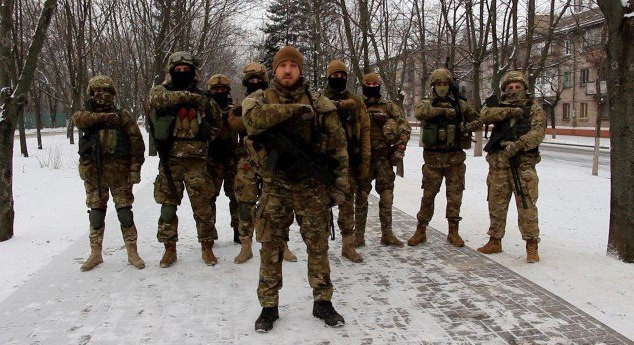
Someone from the Azov ranks said in an interview with Gordon that when you were brought to Olenivka, they ordered the Azov fighters to stand 2 steps forward. Was that how you were identified there?
This surrender took place over 3 days, and at different stages there were appropriate filtration actions. I was identified by the entry on my ID card.
What happened when you were captured by Russian troops? Where were you personally - in Olenivka, Donetsk or Moscow? I understand that there were 3 groups of prisoners.
At first I was in Olenivka, like everyone else. No one has been prepared for captivity, there are no such manuals in Ukraine. Of course, I knew the Geneva Convention, I studied it at university. You have to say nothing and everything at the same time, to become uninteresting. I did everything in my power not to set my people up. They are trying to cling to some word to pin their crimes on us. They are still doing it now. Then I found myself in the Donetsk prosecutor's office, and they prepared a special criminal article for us - participation in the Azov terrorist organization. Although we explained that we were a structural unit of the National Guard of Ukraine. We are a sovereign state and a guarantor of legal law. And they are an unrecognized state, in fact, terrorists. Of course, they thought differently, so for their propaganda they tried to show us not as prisoners of war, but as accused, so most Azov fighters were detained as ordinary thieves in the Donetsk detention center, where they were not treated according to the Geneva Convention.
How Russia prepared the public trial and execution of the Azov fighters
Before August 24, 2022, the propaganda media reported that a trial of the captured Azov fighters was being prepared in Mariupol. There was talk of a public execution. They were trying to secure your status as the main Nazis and fascists in Ukraine. This was facilitated by Russian propaganda, for which you were the worst and most bitter enemy. However, it is believed that the trial was prevented by 2 events. The first was the murder in Russia of Dugin's daughter Daria, who called for the execution of the defenders of Mariupol as a demonstration. And the second was your mother (a well-known Ukrainian journalist in the 90s, and now a writer), who quite clearly said in her interviews for Western and Russian-speaking audiences that Putin actually knows very well what Azov is - these are not fascists, but a regiment that was ahead of the reforms in the army and became a model for the Ukrainian army, which has always been part of the Ukrainian defense forces, and not an informal association, as Russian propaganda claimed. What or who, in your opinion, prevented the occupiers from organizing this trial and execution on Ukraine's Independence Day?
I don't know the full picture, but I am sincerely grateful to all the services, such as Azov Family, our patronage service. To everyone who participated in preventing that trial - politicians, ombudsmen, the military. I personally saw the letters that my mother professionally drafted and sent to the UN and Biden. I am sincerely grateful to all the people who not only prayed for us, but also did some concrete things.
We must continue to work in this direction to prevent such attempts in the future, because there are still many of our girls and boys there.
How did you find out that Putin had decided to exchange you and your comrades for his friend Medvedchuk?
I found out here, on the big land. Not only Medvedchuk was there, it was a big operation. And I thank those who are working in this direction, thanks to them I have the opportunity to sit in front of you, and not be executed or be in jail.
Do you know how many other Azov members are currently in captivity and where they are being held?
About 700 Azov soldiers and more than 1,500 Azovstal defenders are still in captivity. They are both in Russia and on the temporarily occupied territories, and their fate is difficult. That's all I can say. Everyone here should work to get them out of there. So that their actions, which guided them in their service, are not in vain. We have to get everyone out.
How do you feel about the current president, although I understand that you are a military man. Has your attitude to Zelenskyy changed and how do you assess his work?
I will answer quite briefly. I did not vote for him, that's true. He is now my Commander-in-Chief and I respect him.
Are you planning to return to the army now? I know that you are currently undergoing rehabilitation and adaptation. What are your plans?
I am an officer, a major with the National Guard of Ukraine, and I will return to service and will do everything I can to ensure that Azovstal's experience is implemented and we continue to win back our country. I will soon finish my rehabilitation, and thanks to our doctors and Azov's patronage service, I feel much better. I have to come back and fight on.
When and how will the Russian-Ukrainian war end?
You have spent almost a third of your life at war. And probably all of our viewers ask the same thing when they see a soldier - when will the war end and what are the possible scenarios?
When every citizen of Ukraine starts making extra efforts for our victory. Everyone working in their place. It is not necessary to fight at the front line. It's a challenge, so you have to be patient. Usually, we get frustrated quickly, but now we have to be patient, unite and understand that it is difficult for everyone - the guys on the ground, in captivity, in headquarters, at factories, and businessmen. Unfortunately, we will not be able to win an easy victory. When? I have always said that we will not end this war unless we win. Only if we show all our strength, recapture the territory, will we be able to put an end to it. If we don't win back what is ours with the strength of our spirit, the war will be neverending.
Do you agree that this war is the final struggle between Ukraine and Russia, and we have to put an end to the long history of the struggle for our freedom?
When I came back from captivity, I was deeply impressed by the fact that the spirit of Ukraine had emerged, that we had united and a truly Ukrainian nation had been formed. We have to build a civil society on these principles. As Shevchenko said, "Keep fighting—you are sure to win!" so the victory is ours and we will cope with this task.
- News









